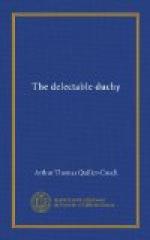Now, the behaviour of the Registrar of Births, Deaths, and Marriages changed as he descended the valley. At first he went from side to side, because the loose stones were sharp and lay unevenly; soon he zig-zagged for another purpose—to peer into the bank for violets, to find a gap between the trees where, by bending down with a hand on each knee and his head tilted back, he could see the primroses stretching in broad sheets to the very edge of the pine-woods. By frequent tilting his collar broke from its stud and his silk hat settled far back on his neck. Next he unbuttoned his waistcoat and loosened his braces; but no, he could not skip—his boots were too tight. He looked at each tree as he passed. “If I could only see”—he muttered. “I’ll swear there used to be one on the right, just here.”
But he could not find it here—perhaps his memory misgave him—and presently turned with decision, climbed the low fence on his left, between him and the hollow of the coombe, and dropped into the plantation on the other side. Here the ground was white in patches with anemones; and as his feet crushed them, descending, the babel of the birds grew louder and louder.
He issued on a small clearing by the edge of the brook, where the grass was a delicate green, each blade pushing up straight as a spear-point from the crumbled earth. Here were more anemones, between patches of last year’s bracken, and on the further slope a mass of daffodils. He pulled out a pocket-knife that had sharpened some hundreds of quill pens, and looking to his right, found what he wanted at once.
It was a sycamore, on which the buds were swelling. He cut a small twig, as big round as his middle finger, and sitting himself down on a barked log, close by, began to measure and cut it to a span’s length, avoiding all knots. Then, taking the knife by the blade between finger and thumb, he tapped the bark gently with the tortoise-shell handle. And as he tapped, his face went back to boyhood again, in spite of the side-whiskers, and his mouth was pursed up to a silent tune.
For ten minutes the tapping continued; the birds ceased their contention, and broke out restlessly at intervals. A rabbit across the brook paused and listened at the funnel-shaped mouth of his hole, which caught the sound and redoubled it.
“Confound these boots!” said the Registrar, and pulling them off, tossed them among the primroses. They were “elastic-sides.”
The tapping ceased. A breath of the land-ward breeze came up, combing out the tangle that winter had made in the grass, caught the brook on the edge of a tiny fall, and puffed it back six inches in a spray of small diamonds. It quickened the whole copse. The oak-saplings rubbed their old leaves one on another, as folks rub their hands, feeling life and warmth; the chestnut-buds groped like an infant’s fingers; and the chorus broke out again, the thrush leading—“Tiurru, tiurru, chippewee; tio-tee, tio-tee; queen, queen, que-een!”




